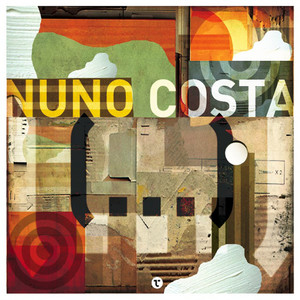
- 歌曲
- 时长
简介
The guitar and its ancestor, the lute, have a long history in Portugaland a rich tradition going back many centuries. So it should come as no surprise that there are a number of fine guitarists emerging or already emerged from the Portuguese Jazz/Improvisational scene. This review article takes a look at three of them. We turn to Nuno Costa and his music. Here’s a larger band with the addition of alto sax. This is in a similar bag to the others and again you can hear some Metheny-Abercrombie influences. But there are frequent spikes of originality and a little more edge than the norm from time to time. There’s a quiet and moody beginning to the album in “ElDorado,” with an ostinato, then melodic extensions on the upper range of the alto with guitar arpeggiation; then back to the ostinato. Further on a syncopated chordal sequence develops and the rhythm section plays in rockish time while the alto takes a solo that is straight forward yet eloquent. Now Costa’s guitar comes in over the rhythm section and states certain tones without hurry, and he gradually branches out from the initial tone sequence and increases intensity without necessarily doing a lot of fast passagework. Piano solos next and has a good sense of chordal extensions and chromatic runs that brings more complexity and density to the piece. Rhythmically he is quite sophisticated too. Some quiet notes-chords on guitar alone map out a nicely put together melodic-harmonic structure on “Primogene.” This is lyrical and hushed—and it sounds a little Brazilian in its lyricism, which I suppose is only to say that it sounds inherently Portuguese, since what is Brazilian has Portuguese roots and there has been a cross-influence, especially in Fado, for example. The guitar solo has a lyrical quasi Methenyness. The alto sounds quite lyrical in his solo aswell and it’s quite nice, a kind of Portuguese Desmond; well almost,anyway. I like this altoist, this Mr. Joao Guimaraes! Oscar Graca gets his shot on piano and he is busier and more chromatic than the others. It gives the improvisations a little contrast. So here’s another perfectly good one. It has a certain ECMish quality again. And the tunes are nice enough. Guimaraes wields a fluid alto and Costa can clearly play and occasionally turns it up a bit. This is subtle Fusion, and not bad at all. On a personal note, the less this sort of music produces an alphabet soup of all the right notes, the more there is the spike of electricity (though not exclusively), the more the pieces veer away from the generic and into the personal and local, the more there is a fire of some sort in the rhythm section, the more I like it. It’s when there is too little of these elements that I feel personal dissatisfaction. (Though I over-generalize for the sake of the point.) That is not to say that everybody will respond to this sort of Fusion in my way. Our personal tastes intervene whatever we hear, and that has to do with our musical pleasure center. Happy the ears that get what they want to hear! Happier the ears that learn to hear more than they have heard before! Nuno Costa - Guitar João Guimarães - Alto Saxophone Óscar Graça - Piano, Fender Rhodes Bernardo Moreira - Double Bass Marcos Cavaleiro - Drums Tone of a Pitch, 2009 Recorded March 10th & 11th, 2008 at Estúdios Timbuktu, Lisboa, Mixed by André Fernandes at Estúdios Timbuktu, Lisboa Mastered by Michael Perez in Brooklyn, NY Artwork by Mackintoxico Artist Photos by Fabio M. Martins Produced by Nuno Costa Executive Production by TOAP Records







